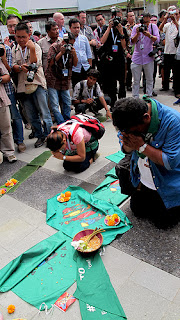The Hindu recently published an Opinion hailing the outcome of the WTO conference at Bali, echoing the words of other corporate sponsored mainstream media. The article can be found here.
We wonder what P. Sainath, their acclaimed rural affairs editor, would comment on this viewpoint, as it is glaringly evident that the WTO Bali Package is only going to benefit the rich trading corporations while snatching away the livelihoods of scores of poor farmers across the developing world. S. Kannaiyan, the dynamic secretary of the SICCFM has written a letter to The Hindu editor, in response to their editorial article. Here is Kannaiyan's letter. We hope The Hindu acknowledges its responsibility towards educating the classes and the masses by publishing Kannaiyan's letter.
Letter to the editor, The Hindu
To,
Editor in Chief,
The Hindu.
Dear Sir,
It was disappointing to see The Hindu editorial dated 13th,
December,2013 , “A good start in Bali” celebrating the results of the
anti people Bali Package adopted at the 9th ministerial of the WTO in
Bali recently.
The Hindu editorial is misleading because it tries to portray both the
signing of the Bali package and India's giving in to US demands to
accept the terrible interim Peace Clause as victories. This is not a
victory at all but a great loss for humanity, because the deal stops
any future affirmative action by governments to carry out food
security programs or farmers' subsidies. The US on the other hand, will
continue to legally pay massive farm and food stamp subsidies.
India had been opposing the Peace Clause until the very end, defending
not just Indian farmers and the hungry, but taking a firm stand for
the 4.2 billion poor peoples of the entire world. India's Food
Security Act and the PDS system are a good model for all other
developing countries to follow. It is unfortunate that India finally
gave in to US demands to accept a very restrictive Peace Clause
and one that applies only to current legislation, preventing any
future food security programmes for all developing countries. Now it is
completely dependent on further negotiations what type of a permanent
solution will be found and if current subsidies or food security
programmes can even exist at the present scale. Lastly, developing
countries will have to accept their guilt in violating WTO rules
before they can even apply the peace clause. No country's government
should have to beg the WTO or any other institution to support its
citizens right to food because that is the right thing to do.
Regards,
Kannaiyan
--
*S.KANNAIYAN.*
*South Indian Coordination Committee of Farmers' Movements (SICCFM)*,
Panakahally ( Village and post ),
Thalavady (Via),
Sathyamangalam Taluk,
Erode District,
Tamil Nadu,
India.
Pin code: 638 461.
*Mobile: +91 9444989543*
Skype: S.Kannaiyan
http://kannaiyan.blogspot.com/
http://siccfm.blogspot.com/
We wonder what P. Sainath, their acclaimed rural affairs editor, would comment on this viewpoint, as it is glaringly evident that the WTO Bali Package is only going to benefit the rich trading corporations while snatching away the livelihoods of scores of poor farmers across the developing world. S. Kannaiyan, the dynamic secretary of the SICCFM has written a letter to The Hindu editor, in response to their editorial article. Here is Kannaiyan's letter. We hope The Hindu acknowledges its responsibility towards educating the classes and the masses by publishing Kannaiyan's letter.
Letter to the editor, The Hindu
To,
Editor in Chief,
The Hindu.
Dear Sir,
It was disappointing to see The Hindu editorial dated 13th,
December,2013 , “A good start in Bali” celebrating the results of the
anti people Bali Package adopted at the 9th ministerial of the WTO in
Bali recently.
The Hindu editorial is misleading because it tries to portray both the
signing of the Bali package and India's giving in to US demands to
accept the terrible interim Peace Clause as victories. This is not a
victory at all but a great loss for humanity, because the deal stops
any future affirmative action by governments to carry out food
security programs or farmers' subsidies. The US on the other hand, will
continue to legally pay massive farm and food stamp subsidies.
India had been opposing the Peace Clause until the very end, defending
not just Indian farmers and the hungry, but taking a firm stand for
the 4.2 billion poor peoples of the entire world. India's Food
Security Act and the PDS system are a good model for all other
developing countries to follow. It is unfortunate that India finally
gave in to US demands to accept a very restrictive Peace Clause
and one that applies only to current legislation, preventing any
future food security programmes for all developing countries. Now it is
completely dependent on further negotiations what type of a permanent
solution will be found and if current subsidies or food security
programmes can even exist at the present scale. Lastly, developing
countries will have to accept their guilt in violating WTO rules
before they can even apply the peace clause. No country's government
should have to beg the WTO or any other institution to support its
citizens right to food because that is the right thing to do.
Regards,
Kannaiyan
--
*S.KANNAIYAN.*
*South Indian Coordination Committee of Farmers' Movements (SICCFM)*,
Panakahally ( Village and post ),
Thalavady (Via),
Sathyamangalam Taluk,
Erode District,
Tamil Nadu,
India.
Pin code: 638 461.
*Mobile: +91 9444989543*
Skype: S.Kannaiyan
http://kannaiyan.blogspot.com/
http://siccfm.blogspot.com/









